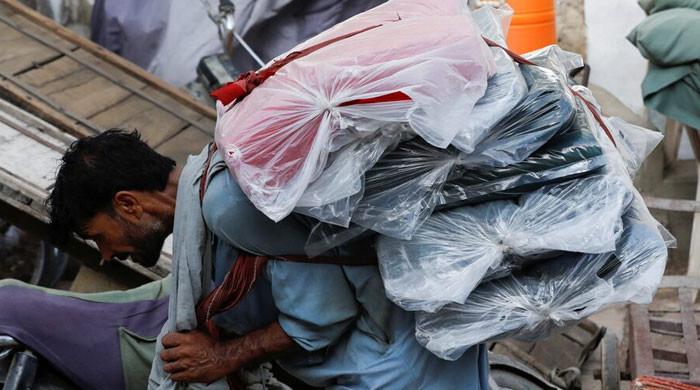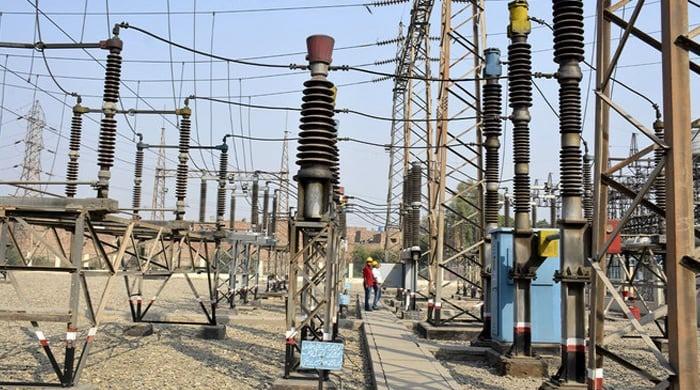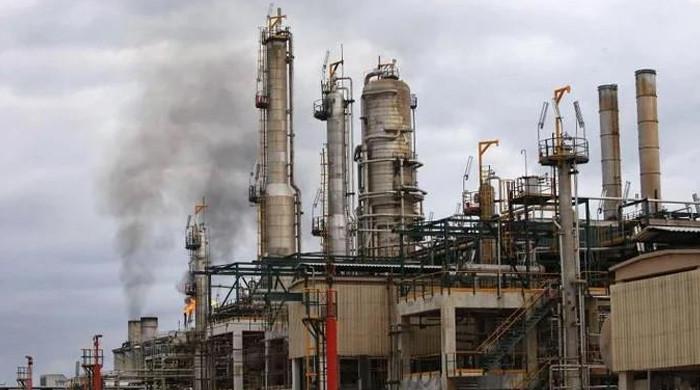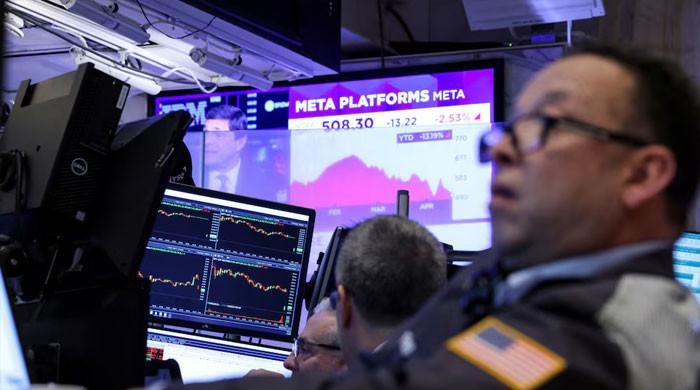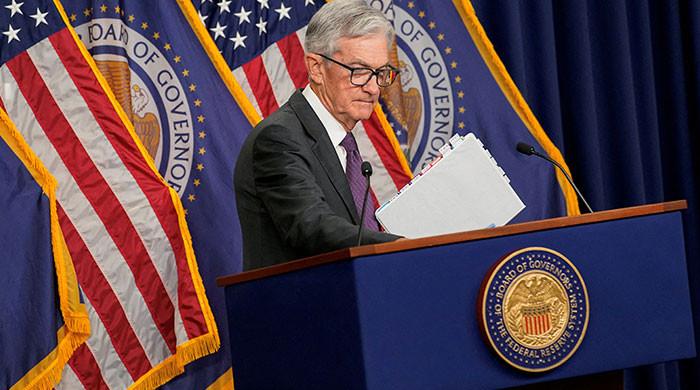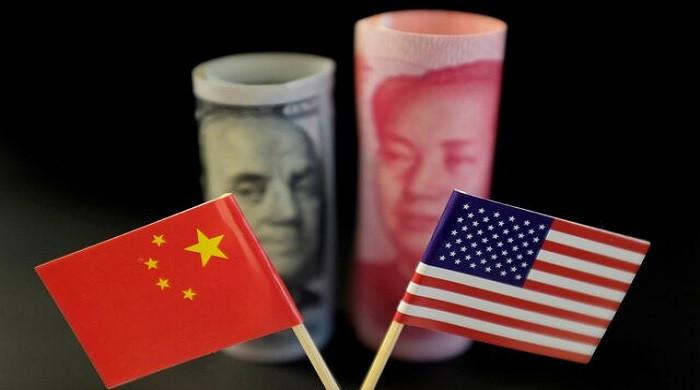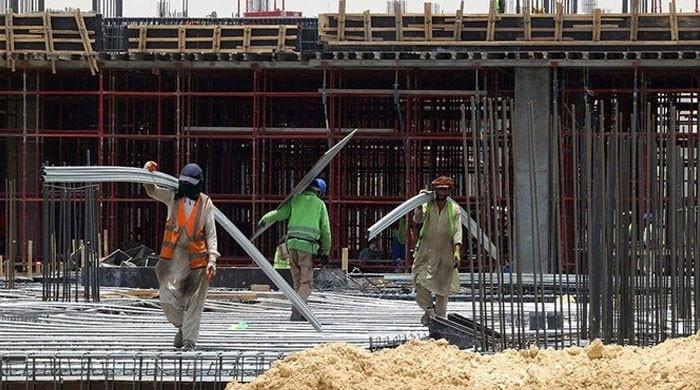PSX review: KSE-100 dives 5%, records biggest weekly decline since March 2020
The sell-off at the PSX persisted for four successive sessions during the week as panic and chaos reigned
November 27, 2021
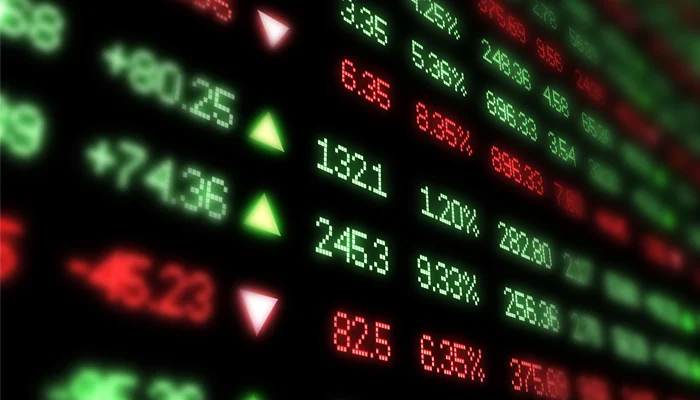
- The sell-off at PSX persisted for four successive sessions during the week as panic and chaos reigned.
- This was the largest weekly decline after March 27, 2020.
- "Going forward, we expect the market to show positivity in the upcoming week," an AHL report predicts.
KARACHI: A chaotic and gloomy week at the Pakistan Stock Exchange (PSX) finally came to an end on Saturday with the index recording its biggest weekly decline since the start of the pandemic in Pakistan (March 2020). The KSE-100 index was down 2,375 points or 5.1% to settle at 44,114.16.
Stocks took a heavy battering following escalating fears of increasing economic uncertainties amid the International Monetary Fund (IMF) releasing the staff concluding statement on the sixth review under the Extended Fund Facility (EFF) with Pakistan at the start of the week.
This was the largest weekly decline after March 27, 2020, according to an Arif Habib Limited (AHL) report.
The sell-off at the PSX persisted for four successive sessions during the week as panic and chaos reigned.
On Monday, contrary to expectations, the bourse began the rollover week on a bearish note as the market succumbed to selling pressure after investors’ sentiment turned sour as the State Bank’s decision to increase the benchmark policy rate by 150 basis points, which was more than the market expectation, took a toll on the investment climate.
Moreover, the confirmation of a staff-level agreement between Pakistan and the IMF failed to entice the market participants as investors adopted a “buy-on-rumour-and-sell-on-confirmation strategy”.
On Tuesday, the jittery investors offloaded their positions amid foreign selling during the week as the bulls remained on the sidelines, taking a cue from the gloomy macroeconomics outlook.
Investors traded cautiously on Wednesday after the circulation of news regarding a mini-budget in the upcoming months and the oil crisis with petroleum dealers announcing a nationwide strike.
The following session brought no respite, as investor mood remained sombre ahead of Morgan Stanley Capital International’s (MSCI) reclassification next week.
It is pertinent to mention here that earlier this month, the MSCI had relocated three leading Pakistani stocks; Lucky Cement, Habib Bank (HBL) and Muslim Commercial Bank (MCB), to its MSCI Pak FM standard cap with effect from December 1, 2021. Resultantly, the benchmark KSE-100 index fell below the 44,000-point mark after a hiatus of nearly one and a half months.
Fortunately, the trend reversed as the four-day bearish spell at the bourse finally came to a halt on the last day of the futures rollover week as investor participation revived at the bourse after the visit of Adviser to Prime Minister on Finance and Revenue Shaukat Tarin.
Other major developments during the week were: Pakistan and the IMF reached a staff-level agreement, SBP jacked up interest rate by 150 basis points to 8.75%, current account deficit posted deficit on higher import bill, the government approved Rs134.9 billion for IPPs, the central bank projected 4-5% growth for FY22, and SBP reserves touched FY22’s lowest level.
Foreigners offloaded stocks this week worth $39.1 million against a net sell of $25 million recorded last week. Selling was witnessed in commercial banks ($15.7 million) and fertiliser ($6.3 million).
On the domestic front, major buying was reported by individuals ($16 million) and companies ($13.3 million).
During the week under review, average volumes clocked in at 264 million shares (up by 8% week-on-week), while average value traded settled at $60 million (up by 13% week-on-week).
Major gainers and losers of the week
Sector-wise negative contributions came from cement (-462 points), commercial banks (-326 points), technology and communication (-290 points), fertiliser (-270 points), and oil and gas exploration (-252 points).
Scrip-wise major losers were Lucky Cement (-205 points), TRG Pakistan (-177 points), HBL (-114 points), Pakistan Petroleum (-98 points) and Engro Corporation (-95 points).
Outlook for next week
A report from AHL predicted: “Going forward, we expect the market to show positivity in the upcoming week attributable to support from Saudi Arabia in terms of safe deposits of $3 billion in the upcoming week.”
The brokerage house noted that this will "release pressure off of foreign exchange reserves, slowdown in international oil prices which will alleviate inflationary pressure, and end of roll-over week".
“However, the last date of the MSCI rebalancing on November 30 might trigger foreign selling, current macro-economic concerns like rising imports, higher inflationary reading due to increasing prices of commodities, and pressure on currency could keep the market range-bound,” it said.
“The KSE-100 is currently trading at a PER of 4.5x (2022) compared to Asia-Pacific regional average of 15x while offering a dividend yield of 8.5% versus 2.2% offered by the region,” the brokerage house stated.




